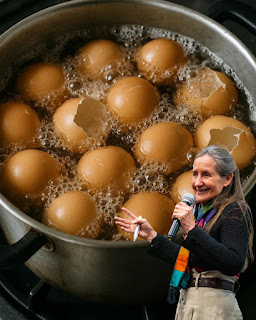Eggs are a staple in many households. They are versatile, nutritious, and inexpensive, making them a go-to ingredient for countless meals. But while most people focus on the egg itself, few consider the potential value of the eggshells. Typically discarded as waste, these shells are in fact a powerful and cost-effective tool for home gardening. Boiling eggshells before disposal can unlock a variety of benefits, from enriching your soil to saving money on fertilizers and garden supplements.
The Nutritional Value of Eggs
Before diving into the benefits of eggshells, it’s worth noting why eggs are so highly valued in a balanced diet. Eggs are a complete food source, packed with essential nutrients. Each egg contains approximately six grams of high-quality protein, which supports muscle maintenance, tissue repair, and immune function.
In addition to protein, eggs contain healthy fats, including conjugated linoleic acid (CLA), which has been linked to improved cardiovascular health. They are also rich in vitamins and minerals such as vitamin A, vitamin D, vitamin B12, selenium, zinc, and iron. These nutrients contribute to overall wellness, including eye and brain health.
Eggs are incredibly versatile in the kitchen. They can be boiled, fried, baked, or incorporated into salads and desserts. Beyond culinary uses, egg whites are often employed in home beauty routines for hair and skin care, demonstrating the egg’s multifaceted value.
Don’t Overlook the Eggshell
While the egg’s interior is undoubtedly valuable, the shell itself is often underestimated. After boiling eggs for dishes like hard-boiled eggs, the shells are usually thrown away. This, however, is a missed opportunity. Eggshells are primarily composed of calcium carbonate, a compound essential for plant growth. By properly processing and reusing them, you can create a natural fertilizer that benefits your garden and saves money on commercial plant supplements.
How Boiling Eggshells Can Benefit Your Garden
The first step is to boil the eggshells. Boiling not only kills any bacteria but also makes the shells easier to crush or grind into a fine powder. Here’s a simple method to prepare them for gardening:
Boil the eggs: Place whole eggs in a pot of water and bring to a boil. Once cooked, remove the eggs and peel them, setting aside the shells.
Clean and sterilize: Ensure any remaining egg white is removed. Boil the shells again for a few minutes to sterilize them.
Crush the shells: Once cooled, crush the shells into smaller pieces. For best results, grind them into a fine powder using a mortar and pestle, food processor, or blender.
Creating a Natural Fertilizer
The powdered eggshells can be added directly to the soil. Calcium is vital for plant growth, particularly for vegetables like tomatoes, peppers, and leafy greens. Adequate calcium strengthens cell walls, supports root development, and helps prevent common plant disorders like blossom end rot.
For a more concentrated solution, you can take the process a step further:
Boil the crushed eggshells in water for an additional hour. This extended boiling process helps break down the shells even further, creating a fine, calcium-rich slurry that can be mixed into the soil or used as a liquid fertilizer.
Adding this eggshell powder to the soil not only boosts calcium levels but also improves soil structure. The rough edges of the crushed shells can deter pests such as slugs and snails, offering a natural defense mechanism without the need for chemical treatments.
Ver continuación en la página siguiente
